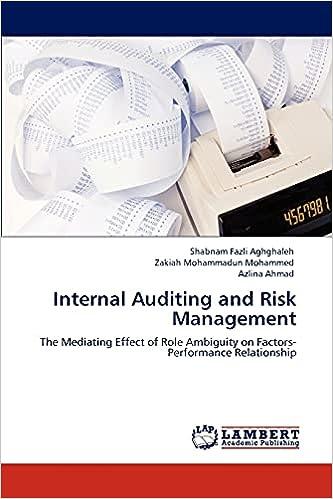Assume that the audit team encountered the following separate situations when deciding on the report to issue for the current-year financial statements for a nonissuer.
Assume that the audit team encountered the following separate situations when deciding on the report to issue for the current-year financial statements for a nonissuer. The audit team decided that sufficient appropriate evidence could not be obtained to complete the audit of significant investments the entity held in a foreign entity. The entity failed to capitalize lease assets and obligations but explained them fully in the notes to the financial statements. These lease obligations meet the criteria for capitalization under ASC 840. The entity is defending a lawsuit on product liability claims. (Customers allege that power saw safety guards were improperly installed.) All facts about the lawsuit are disclosed in the notes to the financial statements, but the audit team believes the entity should record a loss based on a probable settlement mentioned by the entitys attorneys. The entity hired the audit team after taking inventory on December 31. The accounting records and other evidence are not reliable enough to enable the audit team to have sufficient evidence about the proper inventory amount. The FASB requires the energy company to present supplementary oil and gas reserve information outside the basic financial statements. The audit team finds that this information, which is not required as a part of the basic financial statements, has been omitted. The auditors are group auditors of the parent company, but they reviewed the component auditors work and reputation, and decided not to take responsibility for the work of the component auditors on three subsidiary companies included in the consolidated financial statements. The component auditors work amounts to 32 percent of the consolidated assets and 39 percent of the consolidated revenues. The entity changed its depreciation method from units of production to straight line, and its audit team believes the straight-line method is the more appropriate method in the circumstances. The change, fully explained in the notes to the financial statements, has a material effect on the year-to-year comparability of the comparative financial statements. Because the entity has experienced significant operating losses and has had to obtain waivers of debt payment requirements from its lenders, the audit team decides that there is substantial doubt that the entity can continue as a going concern. The entity has fully described all problems in a note in the financial statements and the audit team believes that, while material, the uncertainty is not serious enough to warrant a disclaimer of opinion. Required: a. What kind of opinion should the auditors express in each separate case? (If the kind of opinion depends on the reason for the scope limitation (if applicable), the degree of materiality, and/or the pervasiveness of the matter discussed, then choose an answer choice that encompasses the two possible opinion types.) b What other modification(s) or addition(s) to the standard (unmodified) report is (are) required for each separate case?
Step by Step Solution
There are 3 Steps involved in it
Step: 1

See step-by-step solutions with expert insights and AI powered tools for academic success
Step: 2

Step: 3

Ace Your Homework with AI
Get the answers you need in no time with our AI-driven, step-by-step assistance
Get Started


